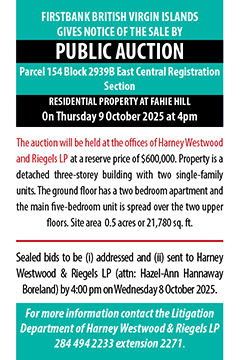Salt Island: The Forgotten & Neglected Island- Part 2 of 3


Part 1 attempted to provide a cursory peek of the proud, hardy, industrious, resolute people; the place; the process of the simple, basic living and survival; the inadequate public sector/policy support; the iconic and famous salt ponds; and the Wreck of the Rhone. In Part 2, I will attempt to flesh out some of these topics and expand into additional areas.
Early Inhabitants
The early inhabitants of the Virgin Islands (British) seemed to include a) the nomadic Ciboney Indians who supposedly migrated from South America, b) Arawaks, c) cannibalistic Caribs, d) western European explorers/settlers, and e) African slaves. It is likely that some, but it is not clear which inhabitants resided on Salt Island. However, it is clear that slaves and their descendants lived on Salt Island. Nonetheless, it is still not clear why slaves were on Salt Island. Was it for agricultural production, salt ponds, natural beauty, quiet and enjoyment, or slave breeding site? The answer to these questions may or may not be conclusively answered. Nevertheless, it is my/our precious ancestral homeland.
Water and Other Utilities
Water is life, and fresh, clean water is a precious resource. However, Salt Island is a water-challenged island/community. Per cousins and Salt Island residents Daisy Smith Durante, Lilymae Durante, Nora Smith Mann, and Arlene Smith Crabbe, the early water sources were from a well near the small pond heading towards Lee Bay. Residents collected water from the well for domestic potable uses. Additionally, after heavy rain, water collected in rocks in the hills above the small pond. Residents capitalize on this temporary water source and use it to wash clothes. Later the government constructed a public cistern near the Salt House in 1959.
Further, in the transition from grass/thatch houses to wood with galvanized or felt roofs, residents captured runoff from the roofs into 55-gallon oil drums. Residents covered the drums typically with flour bags to keep mosquitoes from reproducing wriggles and poured a few drops of kerosene into drums to prevent mosquito reproduction. Moreover, in the modern era, property owners constructed new homes with cisterns; Uncle Clarence Smith was the first to build a detached cistern at his home on Salt Island in 1948-1949.
Moreover, Salt Island was a utility and infrastructure desert. It had no electricity, central sewer system/indoor plumbing, water plant/running water, telephones, improved roads, motorized vehicles/transportation, etc. These utilities and infrastructure are still lacking on Salt Island, albeit Salt Island is currently uninhabited. Henry Leonard aka 'Chicken', my brother, the last permanent resident, relocated in 2008. Thus, these systems are vital considerations in any development/repopulation planning.
Education and Family Separation
Though Salt Island was a small, vibrant community with a population that peaked at approximately 100 people, it had no formal school(s). The Anglican Church constructed a small school on the island in 1837, but its existence was short-lived. It was destroyed in an 1837 hurricane and never reopened (Dr Charles H. Wheatley; Voices and Visions of Education Heroes, Leaders, and Elders (2019)). Incidentally, Dr Wheatley hails from Salt Island heritage.
Moreover, the small school closed, parents, especially mothers, had to beat the bushes to locate families, friends, and others on the Tortola mainland and Virgin Gorda for their children to live with to attend school. In most situations, children landed in a home, not just a place to stay; others had indentured servitude experiences.
Further, mothers and fathers stood teary-eyed and emotional on Salt Island Bay, watching their 4- or 5-year-old sail off to attend school. Painfully, as it turns out, many parents didn’t know that they would only see and interact with some of their children infrequently after the emotional departures. During school holidays, some children had to share the time off between their families on Salt Island and their off-island custodians; they spent more time off-island than with their parents. Moreover, though government/churches funded the public schools, parents bore the other costs. Sending children off to Tortola and Virgin Gorda was vital, but it had a huge opportunity cost. It separated families; it robbed children of the joy and priceless opportunity of growing up together. Most siblings sent off to school on Tortola, and Virgin Gorda rarely resided together in the same home. The above setting describes the Salt Island experience, but it was a similar experience on Cooper Island, Peter Island, and other Southern Cays (Key). Keeping families together was but one of many factors that influenced the families’ difficult decision to relocate to Tortola, contributing to the population decline on Salt Island.
Jobs/Employment/ Food Security
Earlier, I noted that slaves inhabited Salt Island. Slaves were workhorses who produced value for profit for their owners, i.e., sugar, cotton, indigo, or tobacco. Tobacco was most probably grown for home consumption. It (Salt Island) was too small and hilly for a profitable sugar plantation, and cotton was likely grown for profit. My grandfather William Leonard aka 'Bulla', a storyteller extraordinaire, on the way to the Sound one early morning spotted a cotton plant just merely starting to sprout from the ground. Upon his return, in the afternoon, it had already borne cotton. Lol.
Moreover, post-slavery Salt Island had no forced sunup to sundown jobs on a more serious note. All of the residents were self-employed or operated small cooperatives, i.e., seine fishing, goat herding, etc. The most probable source of employment and income was picking salt. Salt Island has two salt ponds integrally connected through unique geological features, i.e., seawater seeps/infiltrates into one pond (pond near Lee Bay) and flows into the large pond through a canal.
Salt Island had a thriving salt industry. In the days before commercially packaged salt and the widespread use of refrigeration, naval and other vessels would purchase salt for seasonings and preserving meat, pork, fish, etc. Harvesting of salt was a significant event and celebration, starting with the Commissioner/Administrator firing a gun to signal the start of the ‘Salt Breaking’ event. The official salt-breaking event commenced, the festivities began with feasting, dancing, etc.; the bacchanal lasted for approximately a week or more. Non-islanders were permitted to pick salt for two days, and after the two days elapsed, only Salt Islanders could pick salt. Presumably, under the Salt Pond Act, one kerosene pan of salt had to be given to the Crown for every three kerosene pans of salt picked. The salt given to the Crown was stored in the Government Salt House, managed by the local government representative. After the Wreck of the Rhone, Queen Victoria, for care and compassion Salt Islanders showed towards the decease, supposedly stipulated that Salt Islanders and their descendants would own Salt Island for their use and quiet and enjoy in perpetuity.
Additionally, the government reduced the prior requirement of supposedly contributing 33% of salt picked to the Crown and instituted a one (1) ceremonial bag per year. The demand for salt decreased, residents engaged and depended primarily on fishing, small stock raising, farming, remittances from a family(s) off-island, etc., for income. Another factor contributing to the decline in the Salt Island population was the emigration by younger Salt Islanders to Tortola, St Thomas, etc., to pursue employment. Further, Salt Islanders were relatively secure in food production, particularly in meat kind, i.e., fish, pork, goats, whelks, turtle, conchs, birds, etc.
Leisure
Salt Islanders were proud, hardworking, industrious, and resolute people with a rich history, culture, and heritage. However, life on Salt Island was as simple and as basic as it gets; it was idyllic, yet no picnic with little time for leisure or planned time off. Life was hard. They were up from dawn to the late evening. They employed work to dispel some of the, perhaps, boredom, isolation, and loneliness. For leisure, they would watch man-o-wars, schooners, and other boats sailing by, engage in debate about local, regional, and international events, read whatever information was available, throw back a few adult beverages, tell stories, etc. I’m biased. But my grandfather William Leonard aka 'Bulla', was the king, the grandmaster of storytelling. One of his best works, his best pearl, was that he sat on Salt Island Bay on a cloudy day and looked towards Red Bay, East End, Tortola, a distance of approximately 3.5 miles, and he could clearly see a mosquito picking a sandfly out of a hole. That was 20/20 vision.







.png)














.png)

















30 Responses to “Salt Island: The Forgotten & Neglected Island- Part 2 of 3”
Like Salt Islanders, Cooper Islanders 3-, 4- and 5-year olds too was shipped to school to either Tortola or Anegada. My parents Cornelius and Maria Leonard too stood teary-eyed and emotional on Crawl Bay watching their children sail off to school. Both Salt Islanders and Cooper Islanders share similar experiences. I was fortunate (nuff respect and thumbs up to guardians) to return to Cooper when school was closed, spending time with my parents and younger siblings. That time home also entailed spending time on Salt with my father.
Was it that their only value was picking salt, catching fish, catching goats etc to meet the need of Town people?
Salt Island and other Southern Cays must have been in some political district. Were their basic needs just simply overlooked because of the social class the elites fling them into. Did their political representative failed miserably to fully represent them? Salt Islanders were a reserve people and just suffered through the indignities, miseries…..etc. Then who would they complain to redress their treatment? No one. Nonetheless, many of their descendants have contributed to the growth and development of the BVI. Many were conditioned not indicate that they had any Cay connection. But all you got to do is shake the family tree and see what falls out. With changing generations, the stigma of being from or being related to Cay folks is waining but it still lingers.
Leonard’s commentary was I’m assuming just the tip of the ice-burg; beneath the surface must be much more. The late John Lewis, civil rights icon, implored us to get in trouble, good trouble. Though I don’t profess to know what was Leonard purpose (perhaps he can elaborate) was, regardless of his intent, it in my opinion tore the scab off a wound but it seems as good scab to tear off a quiet wound that may bring some closure perhaps. Any thoughts/feedback. Social scientists adore feedback.
Moreover, you posited that we should move on. With this attitude, I’m assuming that you are not a Salt Island descendant, for he/she who or whose family lived it knows and feels it. Should the 6,000, 000+ Jews slaughtered/descendants in the Holocaust or the Japanese survivors/descendants interned by the US during WWII or exploited Native/indigenous Americans or the exploited Australian aborigines or the Kenyan Mau Mau just move on?
Further, should the descendants of Slaves who were dehumanized, brutalized, exploited etc move on? No. To the fullest extent practical and possible, they should be made whole. True, it may not be fair to compare the Salt Island people experience to the horrific scale of the foregoing events.